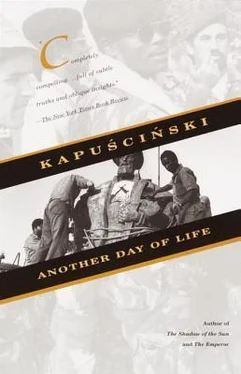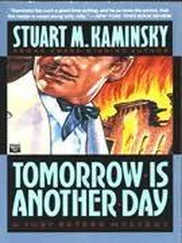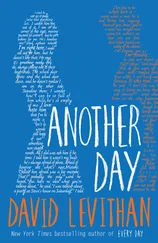Maria treated me like a man who was preparing for suicide after I told her that I’d be staying in Luanda until November 11, when Angola was to become independent. In her opinion there wouldn’t be a stone left standing in the city by then. Everyone would die and Luanda would turn into a great burial place inhabited by vultures and hyenas. She urged me to leave quickly. I bet her a bottle of wine that I’d survive and we’d meet in Lisbon, in the elegant Altis Hotel, at five o’clock in the afternoon of November 15. I was late for the rendezvous, but the desk clerk had a note from Maria telling me she had waited, but was leaving for Brazil with Arturo the next day.
The whole Hotel Tivoli was packed to the transoms and resembled our train stations right after the war: jammed with people by turns excited and apathetic, with stacks of shabby bundles tied together with string. It smelled bad everywhere, sour, and a sticky, choking sultriness filled the building. People were sweating from heat and from fear. There was an apocalyptic mood, an expectation of destruction. Somebody brought word that they were going to bomb the city in the night. Somebody else had learned that in their quarters the blacks were sharpening knives and wanted to try them on Portuguese throats. The uprising was to explode at any moment. What uprising? I asked, so I could write it up for Warsaw. Nobody knew exactly. Just an uprising, and we’ll find out what kind of uprising when it hits us.
Rumor exhausted everyone, plucked at nerves, took away the capacity to think. The city lived in an atmosphere of hysteria and trembled with dread. People didn’t know how to cope with the reality that surrounded them, how to interpret it, get used to it. Men gathered in the hotel corridors to hold councils of war. Uninspired pragmatists favored barricading the Tivoli at night. Those with wider horizons and the ability to see things in a global perspective contended that a telegram appealing for intervention ought to be sent to the UN. But, as is the Latin custom, everything ended in argument.
Every evening a plane flew over the city and dropped leaflets. The plane was painted black, with no lights or markings. The leaflets said that Holden Roberto’s army was outside Luanda and would enter the capital soon, perhaps the next day. To facilitate the conquest, the populace was urged to kill all the Russians, Hungarians, and Poles who commanded the MPLA units and were the cause of the whole war and all the misfortunes that had befallen the distressed nation. This happened in September, when in all Angola there was one person from Eastern Europe — me. Gangs from PIDE were prowling the city; they would come to the hotel and ask who was staying there. They acted with impunity — no authorities existed in Luanda — and they wanted to get even for everything, for the revolution in Portugal, for the loss of Angola, for their shattered careers. Every knock at the door could mean the end for me. I tried not to think about it, which is the only thing to do in such a situation.
The PIDE gangs met in the Adão nightclub next to the hotel. It was always dark there; the waiters carried lanterns. The owner of the club, a fat, ruined playboy with swollen lids veiling his bloodshot eyes, took me into his office once. There were shelves built into the walls from floor to ceiling, and on them stood 226 brands of whisky. He took two pistols from his desk drawer and laid them down in front of him.
“I’m going to kill ten communists with these,” he said, “and then I’ll be happy.”
I looked at him, smiled, and waited to see what he would do. Through the door I could hear music and the thugs having a good time with drunken mulatto girls. The fat man put the pistols back in the drawer and slammed it shut. To this day I don’t know why he let me go. He might have been one of those people you meet sometimes who get less of a kick from killing than from knowing that they could have killed but didn’t.
All September I went to bed uncertain about what would happen that night and the following day. Several types whose faces I came to know hung about. We kept running into each other but never exchanged a word. I didn’t know what to do. I decided right off to stay awake — I didn’t want them catching me in my sleep. But in the middle of the night the tension would ease and I’d fall asleep in my clothes, in my shoes, on the big bed that Dona Cartagina had made with such care.
The MPLA couldn’t protect me. They were far away in the African quarters, or even farther away at the front. The European quarter in which I was living was not yet theirs. That’s why I liked going to the front — it was safer there, more familiar. I could make such journeys only rarely, however. Nobody, not even the people from the staff, could define exactly where the front was. There was neither transport nor communications. Solitary little outfits of greenhorn partisans were lost in enormous, treacherous spaces. They moved here and there without plan or thought. Everybody was fighting a private war, everybody was on his own.
Each evening at nine, Warsaw called. The lights of the telex machine at the hotel reception desk came on and the printer typed out the signal:
814251 PAP PL GOOD EVENING PLEASE SEND
or:
WE FINALLY GOT THROUGH
or:
ANYTHING FOR US TODAY? PLS GA GA
I answered:
OK OK MOM SVP
and turned on the tape with the text of the dispatch.
For me, nine o’clock was the high point of the day — a big event repeated each evening. I wrote daily. I wrote out of the most egocentric of motives: I overcame my inertia and depression in order to produce even the briefest dispatch and so maintain contact with Warsaw, because it rescued me from loneliness and the feeling of abandonment. If there was time, I settled down at the telex long before nine. When the light came on I felt like a wanderer in the desert who catches sight of a spring. I tried every trick I could think of to drag out the length of those séances. I described the details of every battle. I asked what the weather was like at home and complained that I had nothing to eat. But in the end came the moment when Warsaw signed off:
GOOD RECEPTION CONTACT TOMORROW 20 HRS GMT TKS BY BY
and the light went out and I was left alone again.
Luanda was not dying the way our Polish cities died in the last war. There were no air raids, there was no “pacification,” no destruction of district after district. There were no cemeteries in the streets and squares. I don’t remember a single fire. The city was dying the way an oasis dies when the well runs dry: it became empty, fell into inanition, passed into oblivion. But that agony would come later; for the moment there was feverish movement everywhere. Everybody was in a hurry, everybody was clearing out. Everyone was trying to catch the next plane to Europe, to America, to anywhere. Portuguese from all over Angola converged on Luanda. Caravans of automobiles loaded down with people and baggage arrived from the most distant corners of the country. The men were unshaven, the woman tousled and rumpled, the children dirty and sleepy. On the way the refugees linked up in long columns and crossed the country that way, since the bigger the group, the safer it was. At first they checked into the Luanda hotels but later, when there were no vacancies, they drove straight to the airport. A nomad city without streets or houses sprang up around the airport. People lived in the open, perpetually soaked because it was always raining. They were living worse now than the blacks in the African quarter that abutted the airport, but they took it apathetically, with dismal resignation, not knowing whom to curse for their fate. Salazar was dead, Caetano had escaped to Brazil, and the government in Lisbon kept changing. The revolution was to blame for everything, they said, because before that it had been peaceful. Now the government had promised the blacks freedom and the blacks had come to blows among themselves, burning and murdering. They aren’t capable of governing. Let me tell you what a black is like, they would say: he gets drunk and sleeps all day. If he can hang some beads on himself he walks around happy. Work? Nobody works here. They live like a hundred years ago. A hundred? A thousand! I’ve seen ones like that, living like a thousand years ago. You ask me who knows what it was like a thousand years ago? Oh, you can tell for sure. Everybody knows what it was like. This country won’t last long. Mobutu will take a hunk of it, the ones to the south will take their cut, and that’s the end of it. If only I could get out this minute. And never lay eyes on it again. I put in forty years of work here. The sweat of my damn brow. Who will give it back to me now? Do you think anybody can start life all over again?
Читать дальше











